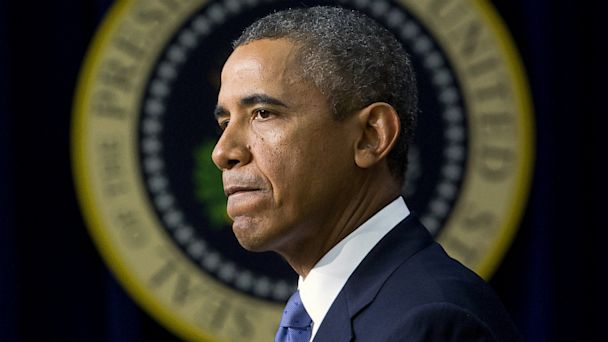Five Years After the Economy's Meltdown, Most Still See Inadequate Safeguards

Pablo Martinez Monsivais/AP Photo
Five years after the economy fell into the abyss, fewer than half of Americans feel it's improved substantially - and two-thirds in a new ABC News/Washington Post poll say the federal government has failed to take adequate steps to prevent another meltdown.
As Barack Obama today marks the anniversary of the Lehman Brothers collapse by heralding economic gains, 51 percent disapprove of how he's handled the economy, vs. 45 percent who approve. Obama hasn't received majority approval for his economic stewardship in ABC/Post polls since November 2009, back in the first year of his presidency.
See PDF with full results and charts here.
But there's skepticism to share. Despite his weak rating, Obama narrowly leads the Republicans in Congress in trust to handle the economy, 44-38 percent. And while 66 percent say the federal government hasn't taken adequate steps to prevent another crisis, about as many, 62 percent, say the country's financial institutions also have failed to put sufficient safeguards in place.
Given those views, just 37 percent in this poll, conducted for ABC by Langer Research Associates, are confident the country will be able to avoid another financial crisis in the future - leaving 62 percent concerned it could happen again.
Obama cited "progress across the board" on the economy in an interview with ABC's George Stephanopoulos that aired Sunday, noting improvements in employment, increased bank lending and the revitalized auto industry. And indeed his ratings for handling the economy never have approached the lows seen by his predecessor; George W. Bush fell as low as 22 percent approval for handling the economy in September 2008.
Yet whatever gains have been realized, the slow pace of recovery, continued high joblessness and stagnant wages have fed continuing frustration. From their perspective, a mere 10 percent of Americans say the economy has recovered "a great deal" in the past five years. Thirty-five percent say it's improved somewhat - a net total of 45 percent who see meaningful gains.
Of the rest, 32 percent say the economy's recovered "just a little," 22 percent not at all; 1 percent volunteer that it's gotten even worse, netting to 54 percent on the negative side of the ledger.
GROUPS - Political predispositions influence economic assessments, particularly when the economy's condition is equivocal, as it is now. Reflecting their far higher approval of Obama's performance, 67 percent of Democrats say the economy's improved a great deal or somewhat since the Lehman collapse. Just 43 percent of political independents agree, dropping further to a mere 22 percent of Republicans. It's similar ideologically, with gains seen by 63 percent of liberals, 51 percent of moderates and just 28 percent of conservatives.
Looking at it another way, 50 percent in Obama-supporting "blue states" from the 2012 election see economic gains, vs. 37 percent in the red states. And 67 percent of blacks, a core Democratic group, see gains, as do 61 percent of all nonwhites, vs. 38 percent of whites.
In an example of the impacts of the country's growing income gap, 58 percent of those with household incomes of more than $100,000 say that from their perspective the economy has improved; that drops to 48 percent of those in the $50,000-$100,000 range and 39 percent with incomes less than $50,000. That bottoms out at 33 percent in under-$20,000 households.
Political differences narrow considerably on the question of the federal government's response to the crisis. Even among Democrats, 55 percent say the government has failed to put adequate safeguards in place; 68 percent of independents and 79 percent of Republicans say the same.
Partisan and ideological gaps nearly disappear, moreover, when it comes to the financial industry: Six in 10 or more across ideological groups, and 59 to 66 percent of Republicans, Democrats and independents alike, say the nation's banks and other financial institutions also have failed to take adequate steps to prevent another economic meltdown.
Such views matter strongly in terms of confidence for the future. Among people who think the government and financial institutions have taken sufficient safeguards, nearly two-thirds express confidence the country will avoid another financial crisis in the future. Among those who don't see adequate safeguards, confidence plummets, to just 26 percent.
METHODOLOGY - This ABC News/Washington Post poll was conducted by telephone Sept. 12-15, 2013, in English and Spanish, among a random national sample of 1,004 adults, including landline and cell-phone-only respondents. Results have a margin of sampling error of 4 points, including design effect. Partisan divisions are 34-23-34 percent, Democrats-Republicans-independents.
The survey was produced for ABC News by Langer Research Associates of New York, N.Y., with sampling, data collection and tabulation by Abt-SRBI of New York, N.Y.